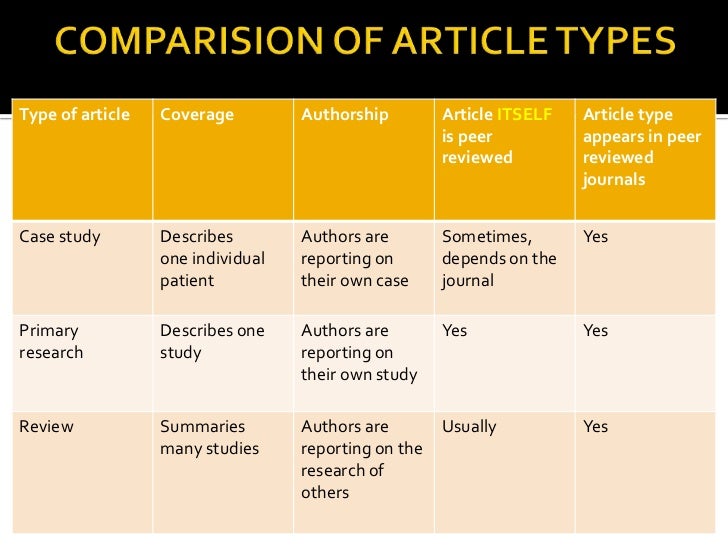
· A list of citations to books, articles, and documents. Each citation is followed by a brief (usually about words) descriptive and evaluative paragraph, which is the annotation. The purpose of the annotation is to inform the reader of the relevance, accuracy, and quality of the sources cited. Literary Review 16 rows · · Systematic search and review. Combines strengths of critical review with a comprehensive search process. Typically addresses broad questions to produce ‘best evidence synthesis’. Aims for exhaustive, comprehensive searching. May or may not include quality assessment. Minimal narrative, tabular summary of studies · This terminology includes such terms or phrases as review of the evidence, 14, 15 comprehensive review, 16 literature review, 17 overview 18 and systematic review. Given the importance evidence‐based practice places upon the retrieval of appropriate information, such diverse terminology could, if unchecked, perpetuate a confusion of indistinct and misapplied terms
Get Started - Pharmacy - Research guides at University of Waterloo
There are many different types of literature reviews, each with its different types of review articles approach, analysis, and purpose. To confuse matters, these types aren't named consistently. The following are some of the more common types of literature reviews. Source: Grant, M. A typology of reviews: an analysis of 14 review types and associated methodologies, different types of review articles.
Contact us for more assistance. Support the Libraries. Libraries Maps Parking Campus A-Z Directory Events WebMail OWL Student Services. Popular Links Popular Links Directory Mail OWL Student Services Websites A - Z Events Libraries Maps Parking WesternU. Catalogue Services Archives and Special Collections Borrowing and Access Faculty and Graduate Support Library Accessibility Our Collections Research Help Study Space, Equipment, and Different types of review articles Teaching and Learning Support Visitor and Alumni Services.
Copyright Open Access Research Data Management Research Metrics Scholarship Western Submit Course Readings Teaching and Learning Support. Archives and Special Collections C. Weldon Library Map and Data Different types of review articles Affiliated Libraries Campus Resource Centres Other Libraries Map of Library Locations. Home Videos and How-Tos typesofliteraturereviews. Literature Reviews, Introduction to Different Types of There are many different types of literature reviews, each with its own approach, analysis, and purpose.
These are more rigorous, with some level of appraisal: The Systematic Review is important to health care and medical trials, and other subjects where methodology and data are important, different types of review articles. Through rigorous review and analysis of literature that meets a specific criteria, the systematic review identifies and compares answers to health care related questions.
The systematic review may include meta-analysis and meta-synthesis, which leads us to The Quantitative or Qualitative Meta-analysis Review can both make up the whole or part of systematic review s. Both are thorough and comprehensive in condensing and making sense of a large body of research. The quantitative meta-analysis reviews quantitative research, is objective, and includes statistical analysis.
The qualitative meta-analysis reviews qualitative research, is subjective or evaluative, or interpretiveand identifies new themes or concepts. These don't always include a formal assessment or analysis: The Literature Review see our Literature Review video or Narrative Review often appears as a chapter in a thesis or dissertation.
It describes what related research has already been conducted, how it informs the thesis, and how the thesis fits into the research in the field. Different types of review articles Critical Review is like a literature review, but requires a more detailed examination of the literature, in order to compare and evaluate a number of perspectives. The Scoping Review is often used at the beginning of an article, dissertation or research proposal.
It is conducted before the research begins, and sets the stage for this research by highlighting gaps in the literature, and explaining the need for the research about to be conducted, which is presented in the remainder of the article.
The Conceptual Review groups articles according to concepts, or categories, or themes. It identifies the current 'understanding' of the given research topic, different types of review articles, discusses how this understanding was reached, and attempts to determine whether a greater understanding can be suggested. It provides a snapshot of where things are with this particular field of research.
The State-of-the-Art Review is conducted periodically, with a focus on the most recent research. It describes what is currently known, understood, or agreed upon regarding the research topic, and highlights where are there still disagreements.
x Contact us for more assistance chat loading Key Topics: Catalogue Services Research Tools Faculty Support Locations Contact Us. Popular Resources: About the Libraries Policies Library Accessibility Library Privacy Statement Land Acknowledgement Support the Libraries.
Understanding The Different Types of Literature Reviews
, time: 5:383. TYPES OF REVIEW - Scholarly Journal Publishing Guide - Guides at McGill Library
· Traditional literature review / narrative review: Characteristics: Describes and appraises previous work but does not describe specific methods by which the reviewed studies were identified, selected and evaluated; Uses: Overviews, discussions, critiques of previous work and the current gaps in knowledge; Often used as rationale for new research · This terminology includes such terms or phrases as review of the evidence, 14, 15 comprehensive review, 16 literature review, 17 overview 18 and systematic review. Given the importance evidence‐based practice places upon the retrieval of appropriate information, such diverse terminology could, if unchecked, perpetuate a confusion of indistinct and misapplied terms The Conceptual Review groups articles according to concepts, or categories, or themes. It identifies the current 'understanding' of the given research topic, discusses how this understanding was reached, and attempts to determine whether a greater understanding can be suggested
No comments:
Post a Comment